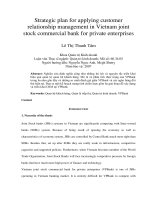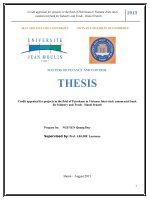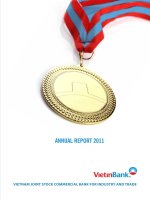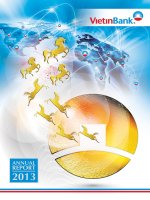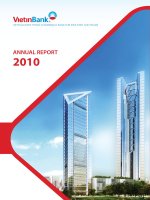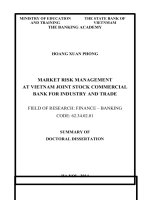Practice of real estate mortgage in vietnam joint stock commercial bank for industry and trade vietinbank
Bạn đang xem bản rút gọn của tài liệu. Xem và tải ngay bản đầy đủ của tài liệu tại đây (794.72 KB, 70 trang )
Practice of Real Estate Mortgage in Vietinbank
Hoang Linh
DECLARATIONS
I declare the following:
(1)
that the material contained in this master’s thesis is the end result of my
own work and that due acknowledgement has been given in the bliography and references
to ALL sources be they printed, electronic or personal.
(2)
that unless this master’s thesis has been confirmed as confidential, I agree to
an entire electronic copy or sections of the master’s thesis to being placed on the eLearning Portal, if deemed appropriate, to allow future students the opportunity to see
examples of past master’s thesis. I understand that if displayed on the e-Learning Portal it
would be made available for no longer than five years and those students would be able to
print off copies or download. The authorship would remain anonymous.
(3)
I agree to my master’s thesis being submitted to a plagiarism detection
service, where it will be stored in a database and compared against work submitted from
this or any other School or from other institutions using the service. In the event of the
service detecting a high degree of similarity between content within the service this will be
reported back to my supervisor and second marker, who may decide to undertake further
investigation that may ultimately lead to disciplinary actions, should instances of
plagiarism be detected.
(4)
I have read the Thesis Guidelines of Master Program on Finance, Bank,
Insurance (Viet Nam and the South East Asia) for Cohort 6, period 2014–2015 and I
declare that ethical issues have been considered, evaluated and appropriately addressed in
this research.
SIGNED*: _________________________________________
DATE:____________________________________________
1
Practice of Real Estate Mortgage in Vietinbank
Hoang Linh
ACKNOWLEDGEMENT
I am using this opportuniy to express my gratitude to everyone who supported me
doing this master’s thesis. I am thankful for their aspiring guidance, invaluably
constructive criticism and friendly advice during the project work. I am sincerely grateful
to them for sharing their truthful and illuminating views on a number of issues related to
the thesis.
First and foremost, I have to thank my advisor, Assoc. Prof. Nguyen Vu Hoang.
Without his assistance and dedicate involvement in everstep throughout the process, this
thesis would have never been accomplish. I would like to thank you very much for your
support and understanding over these past six months.
Secondly, I would like to thank all the lectures, tutors and staffs of International
School – Vietnam National University Hanoi and University de Nantes who are always
enthusiastic for helping me to gain knowledge and experience during the studying.
Thirdly, I would like to show gratitude to the leaders and partners of Vietinbank
for their help and supports during my studying. The impact of their work on my own study
is obvious throughout this thesis.
Most importantly, none of this could have happened without my family. This
thesis stands as a testament to your unconditional love and encouragement.
Thank you!
2
Practice of Real Estate Mortgage in Vietinbank
Hoang Linh
ABSTRACT
Currently, the economic context is stabilizing, the state's policy also has support for
enterprises to solve problems, promote the development of enterprises. Consequently,
demand for credit is also certain developments. However, the problem of bad debts at
banks has not yet definitively settle, causing banks want to grow fast, but even though,
they have to ensure the safety of the banking system. Therefore, making security asset of
borrowers become neccessary, and real estate mortgage is the most preferred.
Consequently, the thesis “Practice of Real Estate Mortgage in Vietnam Joint Stock
Commercial Bank for Industry and Trade (Vietinbank)” has been chosen to help
Vietinbank overcome the obstacles and prevent itself from risks.
The thesis was to clarify the role of lending with mortgages by assets in general and
real estate in particular, expressed the importance of the real estate mortgage in banks’
lending actities. By making comparison and poiting out the differences from the other
countries’ legal framework, the thesis defined progressive outlook that should be applied in
legal framework of Vietnam.
Along with current situation of lending activities with real estate mortgage, the
thesis shown the achievements, limitations and causes of Vietinbank’s internal regulations,
thus, lead to problems need to be focused on the research.
Finally, after analyzing the collected data, based on the result and Vietinbank’s
orientated development, the thesis point out the solutions for changes in legal framework
of Vietnam and completion of Vietinbank’s internal regulations.
3
Practice of Real Estate Mortgage in Vietinbank
TABLE OF CONTENT
4
Hoang Linh
Practice of Real Estate Mortgage in Vietinbank
Hoang Linh
LIST OF ABBREVIATIONS
SM
Security Measures
ST
Security Transactions
RE
RE
AV
Added Value
MC
Mortgage Contract
CC
Credit Contract
VIETINBANK
Vietnam Joint Stock CB for Industry and Trade
SBV
State Bank of Vietnam
CB
Commercial Banks
LUR
Land Use Right
TPC
The People’s Court
EO
Economic Organization
NPO
Notarization Practice Organization
CO
Credit Organization
NRE
Natural Resources and Environment
SA
Security Assets
5
Practice of Real Estate Mortgage in Vietinbank
Hoang Linh
LIST OF CHARTS
Chart 1: The Organization System of VIETINBANK...................................................................... 28
Chart 2: Structure and Executive Apparatus of Headquarters .......................................................... 29
Chart 3: Structure of The Executive Apparatus of The Exchange, Branch .................................... 30
Chart 4: Results of Operations from 2010 to The End of 2014........................................................ 30
6
Practice of Real Estate Mortgage in Vietinbank
Hoang Linh
INTRODUCTION
Security for loans is the measures applied by commercial banks in order toprevent
risks, creat the legal and economuc basis for recovering loans. In the current context of
Vietnam’s economic integration and development, security measures are becomingly
popular and play an important role within the secured transaction participants. Among
those measures and kinds of asset, real estate mortgage is the most preferred.
Real estate is a valued property and always has been the concern of the State in
managing this particular object. Besides the features of a normal property, real estate has
particular characteristics that other assets do not have, namely: irremovability, limit, high
value and long - time use. Consequently, this kind of asset is favourably chosen by the
banks to prevent the risk from lending.
Although there is a legal framework for security transactions, it can not be denied
that there are still many existing difficulties limit the banks' ability to protect themselves
from risks during the progress of applying security transactions in common and real estate
mortgage in particular, such as: unrecovery situation of the economy from the recession;
legal framework lacking of practice and ineed of continuous improvement; unawareness of
the laws and regulations' applicants…Vietnam Joint Stock Commercial Bank for Industry
and Trade (Vietinbank) is not an exception.
Founded in 1988, Joint stock commercial Bank for Investment and Development
of Vietnam now also known as Vietinbank. Over the past century quarter, after the
implementation of equitization according to the guidelines of the State, so far, Vietinbank
has become one of the leading state-owned banks; played the key role in the economy,
implemented the policy effectively the party line, policies and laws of the State in life.
Up to 31 December 2014, Vietinbank has total asset of 661,131 billion dongs,
equity capital of 55,013 billion dongs; charter capital is 37,234 billion dongs; total
liabilities of 444,261 billion dongs; bad dept ratio of 1.00%; staff member of nearly 20,000
people; headquarter located in Hanoi; 01 exchange office; 151 domestic branches, two
branches opened in the Federal Republic of Germany and the People's Democratic Republic
of Laos; 03 representative offices (two domestic and one abroad); over 1,000 exchange
offices/savings office.
With its important role in the banking system of Vietnam, Vietinbank is a specified
object which is suitable to be chosen for doing research, finding out and giving solutions
7
Practice of Real Estate Mortgage in Vietinbank
Hoang Linh
for the existing difficulties in security transactions in order to ensure the rights and
legitimate interests of the banks.
Hence, I decided to choose the topic “Practice of Real Estate Mortgage in Vietnam
Joint Stock Commercial Bank for Industry and Trade (Vietinbank)”.
Research Objective:
The thesis was to clarify the role of lending with mortgages by assets in general and
real estate in particular, expressed the importance of the real estate mortgage in banks’
lending actities. By making comparison and poiting out the differences from the other
countries’ legal framework, the thesis defined progressive outlook that should be applied in
legal framework of Vietnam.
Along with current situation of lending activities with real estate mortgage, the
thesis shown the achievements, limitations and causes of Vietinbank’s internal regulations,
thus, lead to the solutions for changes in legal framework of Vietnam and completion of
Vietinbank’s internal regulations.
Purpose of Study:
The study purpose of the thesis is that the provisions of laws and regulations
relating to security measures in common and real estate mortgage in particular in
Vietinbank; therefore, making conclusions, scientific evaluations about legal aspects of this
matter.
The thesis initially systematizes theories and practice relating to real estate
mortgage in general, those of Vietinbank and Vietinbank’s internal rules in private.
The results of making research will, to some extent, contribute to the quality
enhancement of security measures in common and real estate mortgage in particular in not
only Vietinbank, bu also another commercial banks in banking system of Vietnam.
Scope of Research:
The scope of the thesis are identified in cluding hereby major issues:
-
What is the differences between Vietnam and the other countries over the legal
framework of the security measures in common and the real estates mortgage in particular?
Making comparison and pointing out the progressive outlook that should be applied in
legal framework of Vietnam.
-
Why real estate mortgage is the most favourable measure chosen by the banks in
Vietnam to protect themselves from risks?
8
Practice of Real Estate Mortgage in Vietinbank
-
Hoang Linh
Analyse the internal regulations over the security measures of Vietinbank,
including real estate mortgage. So that, findind out what are the reasons leading to
difficulties during the progress of applying security transactions in Vietinbank?
-
How Vietinbank can complete the internal regulations over the security measures
effectively and adequately?
Research Methods:
In the framework of a master thesis, its methodology is based on dialectical
materialism.
Research methedology of the thesis are synthesis, comparisons and statistic. Those
methedologies are used in doing researchs and making solutions to the issues given in the
thesis.
The thesis get information from different literatures: statistic books; laws and
regulations from another countries; statistic books from Vietinbank and other banks;
journals; periodicals; newspaper; newsletter; reports and documents from banks; etc.
Structure of the thesis:
Besides the introduction, conclusion, appendices and references, the thesis structure
include 3 chapters.
Chapter 1: Overview of the security measures institution and real estate mortgage
to ensure implementation of credit contract in commercial banks in Vietnam.
Chapter 2: Practical implementation of the provisions of the law on real estate mortgage
to ensure implementation credit contract at Vietnam Joinstock Commercial Bank for Industry
and Trade.
Chapter 3: Some recommendations to improve efficiency of mortgage property to
ensure credit contract in Vietnam Joinstock Commercial Bank for Industry and Trade.
9
Practice of Real Estate Mortgage in Vietinbank
Hoang Linh
Chapter 1
OVERVIEW OF REAL ESTATE MORTGAGE TO ENSURE
IMPLEMENTATION OF CREDIT CONTRACT IN COMMERCIAL BANKS IN
VIETNAM
1.1.
The Overview of Real Estate Mortgage
1.1.1. Real Estate:
-
According to international legal systems:
RE is a valued property and always has been the concern of the State in managing
this particular object. Most countries consider RE as land and related assets, inseparable
from the land, determined by the geographical location of the land. However, each country
has different notions about property "associated" with the land is considered as RE.
Japanese Civil Code (2004), Civil Code of North Vietnam and the former Saigon regulates
"crops have not been harvested, fruit trees have not been pluck are RE, soared from plants
are considered as personal property". Thailand Civil and Commerce Code (2005)
stipulates: "RC is land and things attached to the land, including the property rights
associated with the land". Russian Civil Code (1994) has its own approach, on the one
hand listed in the traditional way; on the other hand, given the general term for the
property: "Property is RE whose right to such property must be registered under the
provisions of this Law, is the parcel of land, the underground, independent work
underwater and all things attached to land in the water, but if they can not be moved
without causing serious damage to their use, including housing, construction,
accommodations, and room not to houses, trees and perennial plants, apartment buildings,
now as a unified block assets".
Australian Land Law (2000) including ground and below ground components,
including the air space above ground, including water, bottom part of the water and air
space above the water, all the public construction and investment projects associated with
the ground, above and below ground, or affect adjacent to use that land.
Under English Land Registration in 2002, the ownership of land is not absolute,
people just get ownership of RE on land; In theory, only the right to lease the land from the
10
Practice of Real Estate Mortgage in Vietinbank
Hoang Linh
Queen, but the fact of the form long-term lease (999 years) enjoy the same benefits as the
owner.
-
According to legal system of Vietnam:
Vietnam currently has no uniform legal system for the management of the property
market. The management and use of land is regulated by the Law on Land (1993, 1998,
2001, 2003, 2013); Housing management is regulated by the Law on Housing (1992, 2005,
2014); land relations, housing in civil transactions is regulated by Civil Code.
Article 53 of the Constitution (2013) stipulates: "Land, water resources, natural
resources and minerals, resources in the waters, airspace and other natural resources and
the assets invested and managed by the State, is the public property owned by entire
population and represented by the State to own and unified manage."
Land Law (2003) and Land Law (2013) further confirmed the land is under public
ownership, represented to own by the State. The State retains the highest disposal to land
by implementing specific powers: deciding land use purpose (through planning, plan to
use), defines the term used, communication rentals, withdrawal and land valuation. The
State has the right to benefit from the land through financial policies: use fees and land
rent; use tax, income tax on transfer of land use rights; regulate the value added from land
without investment by land users bring. State grants land use rights for land use through
land allocation, land lease, recognition of land use rights for land use who are stable;
stipulates the rights and obligations of land users. Land Law 2003 further confirmed the
State did not recognize claims of land has been allocated to someone else to use in the
process of implementing land policies of the State through the revolutionary period.
From Article 270 to 284, Civil Code (2005) provisions of other regulations on
ownership such as the obligation to respect the boundaries of the property (Article 270);
Ownership for the boundary markers of the property (Article 271).
Law on Housing (1991) provides: The right to housing of citizens (Article 1);
Housing Fund include: Housing state owned; Houses owned by social organizations,
economic organizations; Houses under private ownership (Article 2).
Properties are the material properties can not remove and exist stabilly for a longterm. Therefore, a property is considered RE only if it meets the following factors: (i) to be
possessed, managed by individuals or a community and specifically valuated; (ii) long-term
survival and can not be relocated or displaced restrictions in certain conditions ensuring
11
Practice of Real Estate Mortgage in Vietinbank
Hoang Linh
morphological, functional use. Accordingly, the property can be classified into the
following groups:
•
Land: Property is naturally given, a resource type can not be destroyed, unless due
to natural disasters: erosion and buried. This is the first natural factor and ultimately
makes a RE. Without land, there will not be RE and vice versa.
•
Buildings and construction attached to land.
•
Other assets attached to land, such as perennial gardens; aquaculture works, salt
fields, untapped agricultural crops...
Besides the features of a normal property, RC has particular characteristics that
other assets do not have, namely:
•
Irremovability. The value of the property and interests associated with a specific
location. Also due to the fixed nature of RE and associated with certain positions,
value and benefits are affected by regional factors and conditions: natural,
socioeconomic and environmental.
•
RE is a form of limit size asset due to the Earth's surface area is limited. The
building is planned by the State locally leads to scarcity of RE. In addition, the
relationship between supply - demand for RE is always unbalanced in the direction:
demand is less than supply, leading to RE speculation. As the market rule, value of
RE in the long run tends to increase, especially in the areas with potential
development.
•
In addition, RE is often asset of great value and long -time use at all in terms of
physical and economic. Land majority exists at the same time; the architectural and
construction work after a period of use is improved, repaired, upgraded may exist
for decades, even hundreds of years or longer.
1.1.2. Real Estate Mortgage:
RE Mortgage is a kind of Security Measures preferable used in banking lending
activities because of its factors mentioned above.
The regulatory SM has existed since ancient times in human history and to this day,
it has been specified in the law of most countries in the world. SM is an effective tool to
prevent violations of the obligor, to ensure the rights and legitimate interests of the oblige.
Therefore, SM plays an important role in civil transactions, especially in business – trade
12
Practice of Real Estate Mortgage in Vietinbank
Hoang Linh
relations.
With the growth of international trade, regulation of the security measures has been
influenced from the English - USA legal system. Meanwhile, due to the particular history
under the rule of colonial feudalism, the regulation in Vietnam similarities with the French
legal system.
Under the guidance of United Nations on International Trade Law (UNCITRAL)
Guide on Secured Transactions (2007), “SM is the transaction to deal secured benefits.
Although the absolute assignment of the receivables does not secure to fulfill the
obligations, to facilitate the reference, SM includes the transfer of receivables". In which,
the secured benefit is an asset benefit associated with a certain property to ensure the
implementation of certain obligations.
Under Article 9 Uniform Commercial Code (2010), "SM is all transactions in any
way, establishing the benefits secured on real property and things attached to RE". It can
be seen "secured benefits" are similar to "SM" . Therefore, in general, law in the world are
similar about SM, despite the differences in terminology used.
Worldwide, the legal system regulates the RE mortgage differently. As stipulated in
Article 214 France Civil Code 1895 (amended many times), mortgage is a property right to
the RE and the object of the mortgage is RE only, not including personal property as in
Vietnam. According to France Civil Code 2118, only following new assets can give
mortgage: "(i) property used in commercial activities and the minor character of the
property is considered as property; (ii) the right to enjoy the yields and profits for the
aforementioned RE and RE sub- items in time have the right to enjoy the yields and
profits". This law defined 3 types of mortgages: by law; Justice and under the agreement.
Thailand Civil and Commercial Code (2005) regulated on RE mortgage from
Article 702 to Article 746 are relatively similar to the provisions in Vietnam in terms of
objects, form and scope of the mortgage obligations and mortgage term. However, the
collateral does not cover the yields and incomes of assets.
Currently, the concept of RE mortgage to secure the credit transactions at
Commercial Banks in Vietnam has not been defined in any legal text. However, based on
the provisions of the law on the SM performing civil obligations, the features of the SM
performing credit transactions at CB and the particular RE characteristics, as discussed
above, we can see: due to the needs of capital for production and business of organizations
13
Practice of Real Estate Mortgage in Vietinbank
Hoang Linh
and individuals, they have pledged or mortgaged assets at CB for loans. The pledged
property and mortgage are diverse and rich, but SM is most applied in RE mortgage. So, in
terms of economy, RE mortgages for loans from CB have an important role to promote
production activities, trading in developed societies.
Thereby, helping banks with business operations efficiently, credit quality is
guaranteed, minimizing the risks in lending activity. Mortgage RE to ensure the
implementation credit transactions at CB is what banks and borrowers agree to use the
property owned by the borrower or a third party to ensure the implementation of the debt
repayment obligations of borrowers in banks, according to the agreement in credit
transactions. Where the borrower does not perform full and timely repayment obligations,
the banks have the right to apply measures to handle the property to recover the debt as
agreed at higher admin and the provisions of law.
However, in accordance with the law, not all RE can be used as financial assets. As
financial assets at CB, RE must meet the conditions at the time of signing credit contract:
-
Under the ownership of the mortgagor.
-
RE is not disputed, complainted or grieft.
-
The property is allowed, is not prohibited or limited transactions.
-
Property has economic value and liquidity.
The mortgaged RE may exist or form in the future according to Article 1 Decree
No.11/2012/ND-CP (2012) including: “the property formed from loans, the property is in
the formative stages or being legally established at the time of signing credit contract, RE
has imaged and subject to the registration of ownership, but after the time of signing
contract, that RE can be registered for ownership in the name of the mortgagor (excluding
land use right) as prescribed by law”.
If in pledge, the pledgor must hand over the property to the pledgee, in mortgage,
the mortgagor only uses the property to ensure, not transfer to the mortgagee. Accordingly,
the RE maintained by the mortgagor or assigned to third parties if the parties agree. The
mortgagor shall be obliged to transfer all the original documents proving ownership of the
property to the mortgagee to hold in the mortgage term. Not transferring the RE does not
affect the rights of the mortgagee, as when the violation occurred and the property must be
transferred to the mortgagee or launch courts in accordance with the law.
The mortgagor directly manages can continue to use and exploit the use of the
14
Practice of Real Estate Mortgage in Vietinbank
Hoang Linh
property; gets the beneficiary, income from RE as agreed on credit contract. However, the
mortgagor can not transfer, donate, converse… the RE, because: all original documents
proving ownership of the property is maintained by the mortgagee; on the other hand,
normally RE mortgage has been registered so without informed consent unwinding of the
mortgagee or the competent authority for the mortgagor has not made the shift trading
venture relating to the property.
Law on Credit Institutions (2010) did not make specific provisions on the order and
procedures for establishing, registering credit contract, termination and disposal of RE. But
in order to create conditions for the CI initiative, flexibility in business operations, the law
stipulates an open way: "Pursuant to the provisions of this Law and other relevant
regulations, CI must build and issue internal regulations for the operations of credit
institutions, ensure mechanisms of control, internal audit, risk management associated
with each business process business, plans for dealing with the emergency". Accordingly,
one of the mandatory internal regulations forces CI to issued "Provisions on risk
management in the operation of CI” and credit institutions must submit to the SBV
regulations right after promulgation (Article 93).
1.2.
Characteristics of Real Estate Mortgage:
1.2.1. Participants:
RE mortgage participants include the mortgagor, mortgagee and the third party
such as asset management party, representative of the secured party, asset disposal party…
In overseas, there is a party to control RE mortgage for creditors. In the
interpretation to Article 16 of the Model Law on ST (1994) issued by the European Bank
for Reconstruction and Development (EBRD Model Law), the RE mortgage controller is
not only a representative; but in practice, he will be on behalf of the secured party to
conduct transactions with third parties relating to the RE mortgage contract
implementation. According to the EBRD Model Law, RE mortgage manager will be
indicated by the secured party. This person has the right to supervise the payment of the
debtor; carry out procedures for handling security assets as prescribed by law; and shall
perform the duties of the secured party to third parties.
In my opinion, this is a progressive regulation, represents the specialization parts of
SM, which Vietnam laws did not. The third party in SM in general and in RE mortgage
15
Practice of Real Estate Mortgage in Vietinbank
Hoang Linh
contract in particular under Vietnam laws only has a sole function: custody of assets.
Monitoring, notification and processing assets remain under the responsibility of the
secured party; hence, rights and interests sometimes are not guaranteed by the secured
party who has no management experience or not specialized in this field. The law should
contain provisions fully and specifically on the legal status of the security transactions
managers. This entity will support the market effectively and efficiently protect the
interests of the disadvantaged creditors. The secured transaction manager will be indicated
by the secured party to represent the secured asset management party, to control related
transactions, the use of funds of the obligor, on behalf of the secured breaching notification
and handling of security assets to the guarantor, on behalf of the secured asset disposal.
This is a necessary regulation for a business environment towards greater economic
efficiency.
1.2.2. Validity:
Unless required by law or agreed between the parties, SM do not automatically
arise and exist. EBRD Model Law acknowledges SM is established by law or on the basis
of a judicial decision or administrative: "The benefits are not necessarily guaranteed to be
established by agreement between the parties, for example in some countries, the
machinery repairer has a privilege (lien) on the repaired machine to ensure the obligation
to pay the repair". Article 318 Civil Code in 2005 stipulates: "Where the parties have
agreed upon or legal provisions on SM, the obligator has to implement that securities
measure”.
About forms of SM, UNCITRAL Legislative Guide on Secured (2007) rules that
contract can be by verbal if the secured party takes the possession of property. In other
cases, the contract must be made in writing. Vietnam law provisions most SM must be in
writing, except for margin and collateral.
Donald and Calvin (1997) state that SM is not only the relationship between the
secured party and the guarantor, but also related to third party; therefore, there are cases
SM must comply with certain procedures to get legal value. Uniform Commercial Code
(2010) introduced the concept of "perfection" (completing SM) to indicate the necessary
legal procedures in order to establish with third party the privileges of secured party to the
property. This term or equivalent wordings are widely used in many countries and in
16
Practice of Real Estate Mortgage in Vietinbank
Hoang Linh
international conventions relating to SM. "Perfection" includes: SM registration, assets
possession/control and perfect SM default (Le Thi Thu Thuy and Do Minh Tuan, 2015).
Vietnam laws do not use the term "perfection" but also specifies the legal
procedures applicable to each SM, property type. For example: Article 3 Decree
83/2010/ND-CP dated 23/07/2010 stipulates SM must register: “mortgage of land use
rights, planted production forests; aircraft, ships and other transactions in accordance
with law". In cases of registering under the provisions of laws, RE mortgage is effective for
third parties from the time of registration. Thus, we can see the similarities between
Vietnamese laws with international rules and laws of the countries on the issue of how to
SM effects against third parties, especially towards RE mortgage.
1.2.3. Privileges:
World Laws set out general principles in determination of the payment priority
order is "first in time rule" (order of time). Act on Security Transaction (2007) provisions
in case of a conflict between the right to demand payment of the creditors on the same
property, the previous SM established creditors will get priority right priority unless
otherwise lost by the legal rules other. Uniform Commercial Code (2010) also stipulates
secured parties registered before enjoying priority than secured party registered later on the
same property.
Similarly, Article 325 Civil Code (2005) also apply the order of time to determine
the order of priority of payment for many unsecured creditors on the same property in case
all register or none of them registers. Thus, priority is determined according to the
registration order or the order of establishment transactions.
In my point of view, this principle ensures maximum benefit of the guarantor as
transparent legal status of the property and should be maintained and developed. However,
in the banking and financial relations in Vietnam, the benefits of bank financing to buy
assets have not been protected. According to Bryan (2001), bank financing benefit defined
on assets acquired (purchase-money security interest), for example: Bank lends the
customers to buy real estate, the real estate are implicitly prioritized for debt repayment
obligations of bank.
In Vietnam, the order of payment priority has been established on the principle
"first time in rule", irrespective of the lending bank. Benefits of the Bank in this case are
17
Practice of Real Estate Mortgage in Vietinbank
Hoang Linh
not guaranteed if the mortgagor commits to use property as security for another obligation
and establish RE mortgage before considering Bank.
1.3.
Procedures to Form Real Estate Mortgage:
By studying the provisions related to this field, it can be seen that the RE mortgage
to ensure the implementation credit contract should be conducted according to the
following order: the RE appraisal and valuation; negotiating and concluding credit
contract; notarization, authentication and registration of mortgages; termination and
disposal of RE.
1.3.1. Appraisal and Valuation:
Tra and Bong (2004) said that RE is an asset of great value. Countries with
developed market economies have focused on building RE valuation system for operation
and control of RE transactions. Many countries offer bulk pricing mechanism and
periodically to adjust the market price for one or more of land in a geographic area. For
example, in Taiwan, once per 3 years, the central government conducts the batch property
valuation (about 300,000 points) in the whole territory. Similarly in Australia, Singapore,
Malaysia, Thailand, batch valuation is performed periodically once each 4-5 years. This is
quite contrary to the provisions of Vietnam. Although the government launched the annual
land price bracket but the transactions relating to the property, including the mortgage
depends on the price agreement between the parties.
For CB in Vietnam, to appraise the property mortgagee, the following steps will be
followed: (i) collect information related to the RE; (ii) Legally appraise the property
through ownership and using certification or other legal documents in accordance with the
law... to determine by whom the RE is owned and used? Is it permittable to mortgage? to
determine whether the assets are eligible for mortgages under the provisions of Civil Code
(2005) and Decree No. 163/2006/ND-CP (2006); (iii) RE Reality Appraisal through direct
examination of the property to determine whether the status, location of assets are
consistent with documents, or through meeting, working with the competent authority or
owner, user of adjacent RE assets to determine if any dispute or located in planned areas?
or risk factors, adverse if the RE is received as security assets. The evaluation may be
organized by CB themselves to perform or sign contract to have professional agencies to
perfom RE appraisal.
18
Practice of Real Estate Mortgage in Vietinbank
Hoang Linh
To have grounds to consider and decide the level of lending, banks must conduct
the necessary measures to determine the value of the property at the time signing the
contract. Property valuation is understood that the valuation of the property in cash as a
basis for determining the level of collateral-based lending. Property valuation is one of the
important processes and procedures which is indispensable in lending by banks to
determine the legality of the secured assets and as a basis for making rational lending rates.
Depending on the structure and operation of each CB, the valuations may be made
by credit department or independent pricing department of banks or hiring independent
valuation organizations as prescribed by law. Although CB executes themselves or leases,
the RE process to valuate often includes the steps of: (i) Determine the property required
for valuation and planning, establish a council or valuation team; (ii) Collect and analyze
data and information relating to the property to serve for the valuation ; (iii) Select the
method of valuation; (iv) compare the actual value and the estimated value of the property
to offer price; and (v) Complete appraisal reports to make the minutes of the pricing or
valuation certificate. RE is a special form of assets, having diversity and many differences
compared to other asset types, so the valuation of the property requires the particular
methods and determined manners. There are several methods for valuing property; in
which, the methods commonly used are: comparison method; cost method ; method of
surplus value (residual value) and investment .
1.3.2. Negotiating and Signing Contract:
Based on the results of RE pricing, if the bank determines eligibility for mortgages,
the parties base on the basic principles defined from Articles 388 to 400 of Civil Code
(2005) and related legal regulation to negotiate the basic content of mortgage contract. On
principle, RE mortgage contract must be made in writing, either in a separate document or
recorded in credit contract. The subject of the mortgage property relations to ensure the
implementation credit contract including: the mortgagee is a lending bank and the property
mortgagee can be the borrowers or third parties - the owners and users of the property.
Indeed, CB have set up independent RE mortgage contract compared to the credit contract,
with complete specific terms by banks and security assets to agree. Under the provisions of
subsection III Section 5 of Chapter XVII and Chapter XXX of Civil Code (2005) and the
relating legal documents, RE mortgage contract has following major contents:
19
Practice of Real Estate Mortgage in Vietinbank
Hoang Linh
-
Day, month, year and place of establishment of the contract;
-
Name and address of the parties (the mortgagee and the mortgagor);
-
Description of the relevant information, the value of the property. Obligations
guaranteed.
-
Property ownership papers and content agreement on the holding of RE;
-
The rights and obligations of the parties to the contract;
-
The agreement on how to handle the property when it occurred violations. Other
agreements involved.
1.3.3. Notaries and Authentication:
-
Article 343 Civil Code (2005) stipulates: "Where the law stipulates, mortgage
documents must be notarized, certified or registered". The current law has the following
provisions on notarization and authentication for higher admin property:
•
The provisions at point a and d , Clause 3, Article 167 of the Land Law (2013), the
credit contract of Land Use Right, Land Use Right and assets attached to land must
be notarized or authenticated. The notarization is done at the Notary Organisation;
the authentication is done at communal People’s Committee.
•
Also, the notarization and authentication credit contract is also made by agreement
of the parties (Article 9 of the Law on Notaries).
-
On the Notaries authority: as stipulated in Clause 1, Article 37 and Article 47 of the
Law on Notaries, Notariers of notary organisation perform notaries for mortgage contract
within provinces and cities under central authority where the property maintains. Where
there is more than one RE in the provinces and cities directly under the central government,
along been mortgaged to secure the performance of an obligation, the notary of that
mortgage contract will be performed by Notaries headquartered in provinces under the
central location of the property there is a conducted.
A property has been mortgaged to secure the performance of an obligation and
credit contract has been notarized which is then further collateral to secure a different
obligations within the scope permitted by law, the amendmend and stipulation of mortgage
contract must be notarized by the first Notarier who notarized the mortgage contract.
Where the first Notarier of mortgage contract changed to another Notarisation
organization, or no longer practice notarization or unable to perform the notarization, the
20
Practice of Real Estate Mortgage in Vietinbank
Hoang Linh
Notarier of such Notarisation organisation are hosting that notarized mortgage contract will
perform notarization for it. These provisions apply both to property in industrial parks,
economic zones, hi-tech parks (including land use right).
-
On the order and procedures: RE mortgage contract can be previously prepared or
prepared by Notariers at the request of the person requesting to notarise. In principle, the
parties entered into the RE mortgage contract, the witnesses must sign or fingerprint or
signature and fingerprint (if the parties agree) on the mortgage contract in front of
Notariers. Also, due to the signing of the RE mortgage contract of CI regularly with large
number of transactions. Therefore, to create favorable conditions for credit institutions to
sign mortgage contract, Notary Law (2004) allows:
Where the competent contracting of credit institutions, other entities registered in
Notarisation organisation specimen signature, it may enter into contracts before; notary
must compare their signature with the signature notarized form before notarisation. Thus,
we can see only the CI and new businesses may register the model signature at notarization
organization and sign prior to the property credit contract, to all individuals, households
and other entities (cooperatives, cooperatives, and other organizations are not business
entities), they still have to sign or fingerprint on the mortgage contract in front of
Notariers.
-
For higher authorities to authenticate property: under the provisions of the Housing
Law and Land Law (2013), the power to endorse mortgage contract for houses under
districtal People’s Committee for housing in urban areas, communal PC is authorized for
mortgage contract for rural housing and land use right. However, under the provisions of the
Law on Notaries and Decree No. 79/2007/ND-CP (2007) on the issue of copies from master
registers , authentication of copies from originals and authentication of signatures notaries
are only authenticated by Notariers of Notarisation Organisation for contract, transation
relating to RE, districtal or communal PC do not have authorities to authenticate contracts
and transactions in general.
Article 8 Circular No. 03/2008/TT-BTP dated 25/8/2008 of the Ministry of Justice
in guiding the implementation of Decree No.79/2007/ND-CP of the Government dated
18/5/2007 has determined: “notary is what a notarier certificates of authenticity, the
legality of the contract or transaction; while district-level Justice Department, CPC
authorized authentication of copies from originals papers, certification. PPC should
21
Practice of Real Estate Mortgage in Vietinbank
Hoang Linh
implement measures to develop local notarization organization in local in cases in the
district has no notarization organization, the participants of the chosen credit contract,
transaction of different localities or certified by the CPC in accordance with law”. In
paragraph 2 and 3 of Article 83 Law on Promulgation of Legal Normative Documents
(2008) provides: “In the case of legal documents have different provisions on the same
matter, the documents with legally higher base will be applied. In the case of legal
documents issued by the same agency having various regulations on the same issue, the
applicable provisions of the document was issued later”.
From the grounds cited above, we can see the provisions of the law on this issue
still includes contradictions, not yet defined, specifically explaned. Under the provisions of
the Law on Promulgation of legal documents, the notarization and authentication of the
land use right and property mortgage contract as land use right and assets attached to the
land comply with the provisions of the Land Law 2013 (Law on Notaries issued after
2006); authentication of RE mortgage contract is land use right and assets attached to the
land will be performed in compliance with also validating the housing property must
comply with the provisions of the Law on Notaries (2006) (issued after the Housing Act
2005) and Decree No. 79 above and so, are DPC and CPC authorised to authenticate
mortgage contract in which credit assets are land use right and housing or not? On the
order and procedures for authentication of these transactions, the current text did not have
any legal provisions. So after the Notary Law and Decree 79 takes effect, authentication of
land use right and housing mortgage contract has not yet been implemented (except local
has no notarisation organisation).
1.3.4. Registration:
World law regulated the registration of RE oriented compulsory or voluntary.
Property Registration Law of the Russian Federation (1997) provides: "State
Register of rights to RE and RE transactions are legal event recognized and certified by
the state, the occurrence, limit, transfer or termination of rights to property under the
provisions of the Russian Federation Civil Code". Thus, in Russia, the registration is made
compulsory, not specified the cases of voluntary registration. Without the registration, the
SM by RE will not be recognized and protected by the State, thereby not establishing the
rights of the parties to the transaction.
22
Practice of Real Estate Mortgage in Vietinbank
Hoang Linh
Property Registration Law of Korea (2009) and Japan (2004) did not specify on the
principle of registration. However, the registration is done on the principle of voluntary,
based on the provisions on the validity of the registration. Article 177 Civil Code of Japan
(2006) stipulates: "The owner of the property is not against a third party without the
registration of ownership, loss or change of the Law on Registration of RE". Article 6
Property Registration Law of Japan (2004) also defined the validity of the registration of
an indirect way through the provisions of the order of priority of rights to RE: “Unless
otherwise stated, the order of registration rights to the same property will be determined
by order of registration of such rights".
Property Registration Act of Korea in 2009 also have similar provisions: "The
order of priority of the rights to the same property registered is identified in order to
register, unless other provisions of law" [Article 5]. Pursuant to this provision, can
determine the registration of RE is not mandatory. However, if people have the right to
non- performing RE registration, shall not be entitled to antagonism with third parties.
Vietnam law forced RE mortgage transactions must register to ensure to validate.
Article 12 Decree No. 163/2006/ND-CP (2006) on SM and Point 1, Article 3 Decree No
83/2010/ND-CP (2010) on SM registration provisions to register SM include: land use right
mortgage, mortgage forest use rights and ownership right over planted production forests,
mortgage aircraft, ships, aircraft and other cases if the law provides. These SM have effect
from the time of registration of the mortgage. So we can see: except for the above assets,
the mortgage and other RE not required for mortgage registration, mortgage registration
shall be made only if the parties agree.
On the order and procedures for registration of mortgage: people require registration
of mortgage (the mortgage or bank) must send to the SM registries a SM registration dossier
includes: application for SM registration, RE mortgage contract and papers relating to the
ownership and use of assets and a certified copy of proof of legal status from registration
requirements. SM Registration Agency will receive records request and resolve: deny or
proceed to register SM and give result in accordance with law.
1.3.5. Handling:
As stipulated in Article 744 of Thailand Civil and Commercial Code (2005), a
mortgage contract may be terminated if: (i) terminate the obligation secured; (ii) have
clearly described the mortgager in writing; (iii) an exemption for mortgagers; and (iv) the
23
Practice of Real Estate Mortgage in Vietinbank
Hoang Linh
cancellation of mortgage contract. Another form of treatment as prescribed by law in
Thailand is to enforce mortgage contract. For enforcement, the mortgagee must notify in
writing to the person indebted to implement their obligations within a reasonable period has
been fixed in the notice. If debtors do not do exactly as stated, then the mortgagee may sue
before the court to order the forfeiture proposed collateral to put up for auction. This
provision is similar to the provisions of the law of Vietnam.
As stipulated in Article 357 Civil Code (2005), when debt repayment obligation has
been fulfilled, the property mortgage contract also automatically terminate in accordance
with credit contract. RE mortgage contract may also terminate if the parties agree or being
replaced by another suitable SM or mortgagor (in cases property owners are third parties) to
repay debts, the RE borrowers will not be punished. Also, when RE is being handled, at the
end of the handle, the property is transferred to another person, property mortgage contract
will be naturally terminated.
-
According to legal provisions, the banks are entitled to handle the property to
recover the debt in the following specific cases:
•
The borrower fails to repay obligations fully and on time.
•
Borrowers violated the credit contract and the Banks decided to apply measures to
recover the loan before the maturity date, but the borrower fails to comply with the
obligation to repay the loan before maturity.
•
The law stipulates that the property must be processed to perform other duties. This
is the case of a property used to order security for many loans, and when one of
these loans due date and the borrower fails to limit the repayment in full and on
time, the property must be processed to recover debts.
•
-
Other cases agreed by the parties or required by law.
In principle of handling: The handling of the mortgage must comply with the
principles defined in Article 58 Decree No.163/2006/ND-CP (2006), in particular:
•
The disposal of assets is performed as agreed upon by the parties (the guarantor, the
secured party or the secured parties); if there is no agreement or fails in agreement
is reached, the property will be sold at auction in accordance with the law.
•
The handling of the mortgage must be objective, open and transparent, ensure the
rights and legitimate interests of the parties , individuals or organizations concerned
24
Practice of Real Estate Mortgage in Vietinbank
Hoang Linh
and in accordance with the provisions of law.
•
The disposal of mortgage that secured party or the secured party authorization,
unless the parties agree otherwise. The asset disposal solver bases on content
agreed on credit contract to proceed without a written authorization to handle the
assets of the guarantor.
•
The handling of the mortgage is not taxable under the provisions of law.
•
In case the mortgage is land use right, housing, organizations and individuals
purchase or receive the collateral alternative to implement the obligations of the
guarantor must be eligible for license granting land use right, ownership of house
and the assets attached to land; otherwise, they are only entitled to the value of land
use right , the value of housing.
-
Regarding the method to handle property: Property in principle is handled
according to the agreement on mortgage contract or a written agreement of asset disposal.
Where the parties can not handle in a manner agreed upon, the bank has the right to
actively choose one of the methods for handling as defined in Article 59 Decree
No.163/2006/ND-CP and Circular No. 16/2014 /TTLT-BTP-BTNMT-NHNN (2014)
guiding some collateral issues, specifically:
•
Sale of property: bank or the guarantor or the parties agree to sell the property
directly to the purchaser or lease or authorize a third party auction or direct sale to
buyers.
•
Get the RE as an alternative to the implementation of security obligations: bank
directly receives the RE, RE values obtained are defined as treatment at the nearest
time basis to offset against the loan amount, interest arising from credit contract
and other reasonable expenses as prescribed by law. The securer receive the
remaining amount after full payment obligations to the bank. If the value of the
property is insufficient to pay the value of the obligation, the borrower has the
responsibility to repay the outstanding amount to the bank. If the bank is not
entitled to establish ownership and use rights for the property to be treated as
prescribed by law, the parties select different processing methods to make.
•
Other methods agreed by the parties.
25
